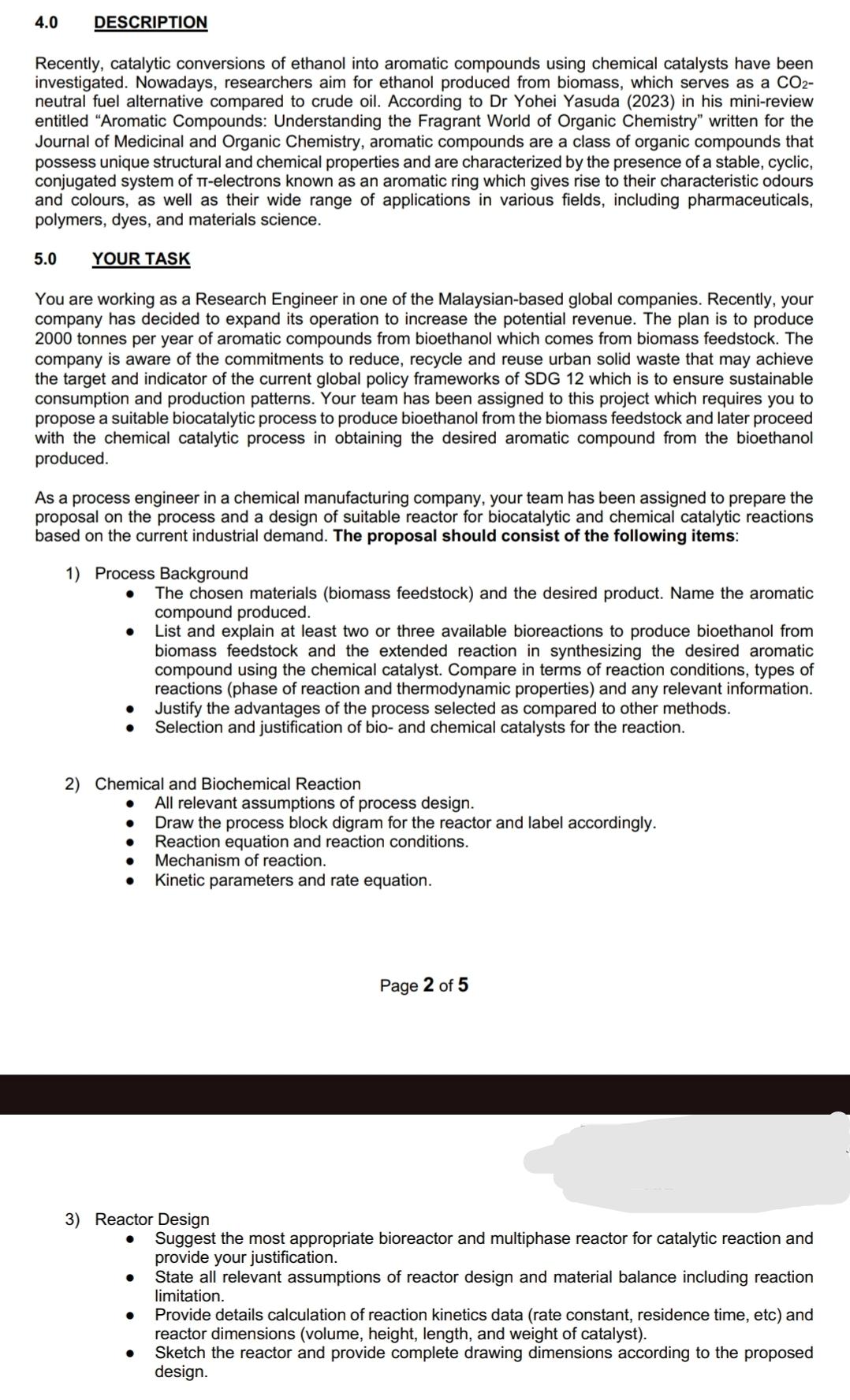Answered step by step
Verified Expert Solution
Question
1 Approved Answer
4 . 0 DESCRIPTION Recently, catalytic conversions of ethanol into aromatic compounds using chemical catalysts have been investigated. Nowadays, researchers aim for ethanol produced from
DESCRIPTION
Recently, catalytic conversions of ethanol into aromatic compounds using chemical catalysts have been investigated. Nowadays, researchers aim for ethanol produced from biomass, which serves as a neutral fuel alternative compared to crude oil. According to Dr Yohei Yasuda in his minireview entitled "Aromatic Compounds: Understanding the Fragrant World of Organic Chemistry" written for the Journal of Medicinal and Organic Chemistry, aromatic compounds are a class of organic compounds that possess unique structural and chemical properties and are characterized by the presence of a stable, cyclic, conjugated system of electrons known as an aromatic ring which gives rise to their characteristic odours and colours, as well as their wide range of applications in various fields, including pharmaceuticals, polymers, dyes, and materials science.
YOUR TASK
You are working as a Research Engineer in one of the Malaysianbased global companies. Recently, your company has decided to expand its operation to increase the potential revenue. The plan is to produce tonnes per year of aromatic compounds from bioethanol which comes from biomass feedstock. The company is aware of the commitments to reduce, recycle and reuse urban solid waste that may achieve the target and indicator of the current global policy frameworks of SDG which is to ensure sustainable consumption and production patterns. Your team has been assigned to this project which requires you to propose a suitable biocatalytic process to produce bioethanol from the biomass feedstock and later proceed with the chemical catalytic process in obtaining the desired aromatic compound from the bioethanol produced.
As a process engineer in a chemical manufacturing company, your team has been assigned to prepare the proposal on the process and a design of suitable reactor for biocatalytic and chemical catalytic reactions based on the current industrial demand. The proposal should consist of the following items:
Process Background
The chosen materials biomass feedstock and the desired product. Name the aromatic compound produced.
List and explain at least two or three available bioreactions to produce bioethanol from biomass feedstock and the extended reaction in synthesizing the desired aromatic compound using the chemical catalyst. Compare in terms of reaction conditions, types of reactions phase of reaction and thermodynamic properties and any relevant information.
Justify the advantages of the process selected as compared to other methods.
Selection and justification of bio and chemical catalysts for the reaction.
Chemical and Biochemical Reaction
All relevant assumptions of process design.
Draw the process block digram for the reactor and label accordingly.
Reaction equation and reaction conditions.
Mechanism of reaction.
Kinetic parameters and rate equation.
Page of
Reactor Design
Suggest the most appropriate bioreactor and multiphase reactor for catalytic reaction and provide your justification.
State all relevant assumptions of reactor design and material balance including reaction limitation
Provide details calculation of reaction kinetics data rate constant, residence time, etc and reactor dimensions volume height, length, and weight of catalyst
Sketch the reactor and provide complete drawing dimensions according to the proposed design.

Step by Step Solution
There are 3 Steps involved in it
Step: 1

Get Instant Access to Expert-Tailored Solutions
See step-by-step solutions with expert insights and AI powered tools for academic success
Step: 2

Step: 3

Ace Your Homework with AI
Get the answers you need in no time with our AI-driven, step-by-step assistance
Get Started


